Dissemination Event- Dublin
An event was held in Dublin on September 27th in IMMA’s lecture theatre.

The event brought together a range of teachers, academics, teacher trainers from Dublin universities as well as representatives from NGOs, environmental organisations, youth workers and parents and guardians from the D7ET school community.

We were lucky to have the event hosted by Evie Kenny, who is behind the national broadcaster’s podcast on environmental and sustainabilty issues. The event was recorded to be included in a forthcoming podcast that will look at how schools are engaging with the climate emergency.

Evie interviewed students who had completed CEPNET projects, teachers involved in CEPNET delivery and a principal who spoke about how participation in CEPNET had contributed to a wide range of benefits in their school, not least the animation of a new group of active young citizens.

An important part of the event was linked to the CEPNET website. In launching and promoting the website, there was the opportunity to share further the resources developed and the tips and guides to using the CEPNET approach. It was described by one of the audience as a “one stop shop” for getting to know and work with the approach.

We were also lucky to have participants at our event who are directly involved in an Environmental Festival that was due to take place in IMMA, the Earth Rising EcoFest. We got to hear about the intended highlights and how we could get involved.

A lively questions and answers session, following the presentations and interviews, allowed some of our guests to quiz the students on some of the impacts as they saw it.

Participants also had the opportunity to discuss more informally with the students about their projects and experiences of participating in the project. The students spoke about the importance of being able to get to know their peers in the other schools and how much they enjoyed these online discussions and sharing exercises.


